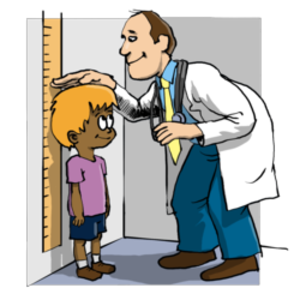Height and Quality of Life

It’s difficult to guess it from that mug shot over on the left, but your humble reporter is six foot four, or, for our more metrically inclined friends, 193 centimeters. Believe it or not, on my mother’s side of the family, that would have made me one of the shortest. Over the years I have heard all the arguments about boys getting their height form their mothers, height being correlated with various maladies, and the old chestnut about tall people being more successful. Something that clearly escaped Alexander the Great, Napoleon Bonaparte and Adolph Hitler.
Nonetheless, some interesting correlations between height and psychological measures have begun to emerge in recent years.
Regular readers may recall the work from the West of England that has found some association between growth hormone and intelligence.
A new study in the journal Clinical Endocrinology indicates that your height in adult life significantly affects your quality of life, with shorter people reporting worse physical and mental health than people of “average” height. Shorter people judge their state of health to be significantly lower than their “normal” height peers do. I put quotes around words like “average” and “normal, since they have particular scientific rather than personal connotations.
The data for this study came from 14,416 people enrolled in the 2003 Health Survey for England, carried out by the UK Department of Health. In this survey, participants filled out a health-related quality of life (HRQoL) questionnaire and a nurse measured their height. A person’s health-related quality of life refers to their perceived physical and mental health over time rather than a measure of his or her actual health.
People in the shortest height category (men shorter than 162 cm {5 foot four inches} and women shorter than 151 cm {4foot eleven inches}) reported they experience significantly lower HRQoL than people of “normal” height. The effect size is more pronounced the shorter a person is. This means that a small increase in height has a much larger positive effect on a short person than it does on a person of “normal” height.
One of the reasons for doing this study, which was supported by Novo Nordisk, is that there are some uncommon problems such as growth hormone deficiency or Turner syndrome in which people have short stature. The argument is that if their height causes psychological distress, there is a greater justification for treatment with growth hormone, which can increase their final adult height by approximately 4-10 cm (1.5 to 4 inches) depending on the underlying cause.
There is also another point. Some people already have a shorter stature, and most are perfectly well adapted. But it is important to be aware that some may be suffering in silence, and it is so important to ensure that they get the help that they need.
We cannot cure everything problem in the world, but we should be able to treat anything.






